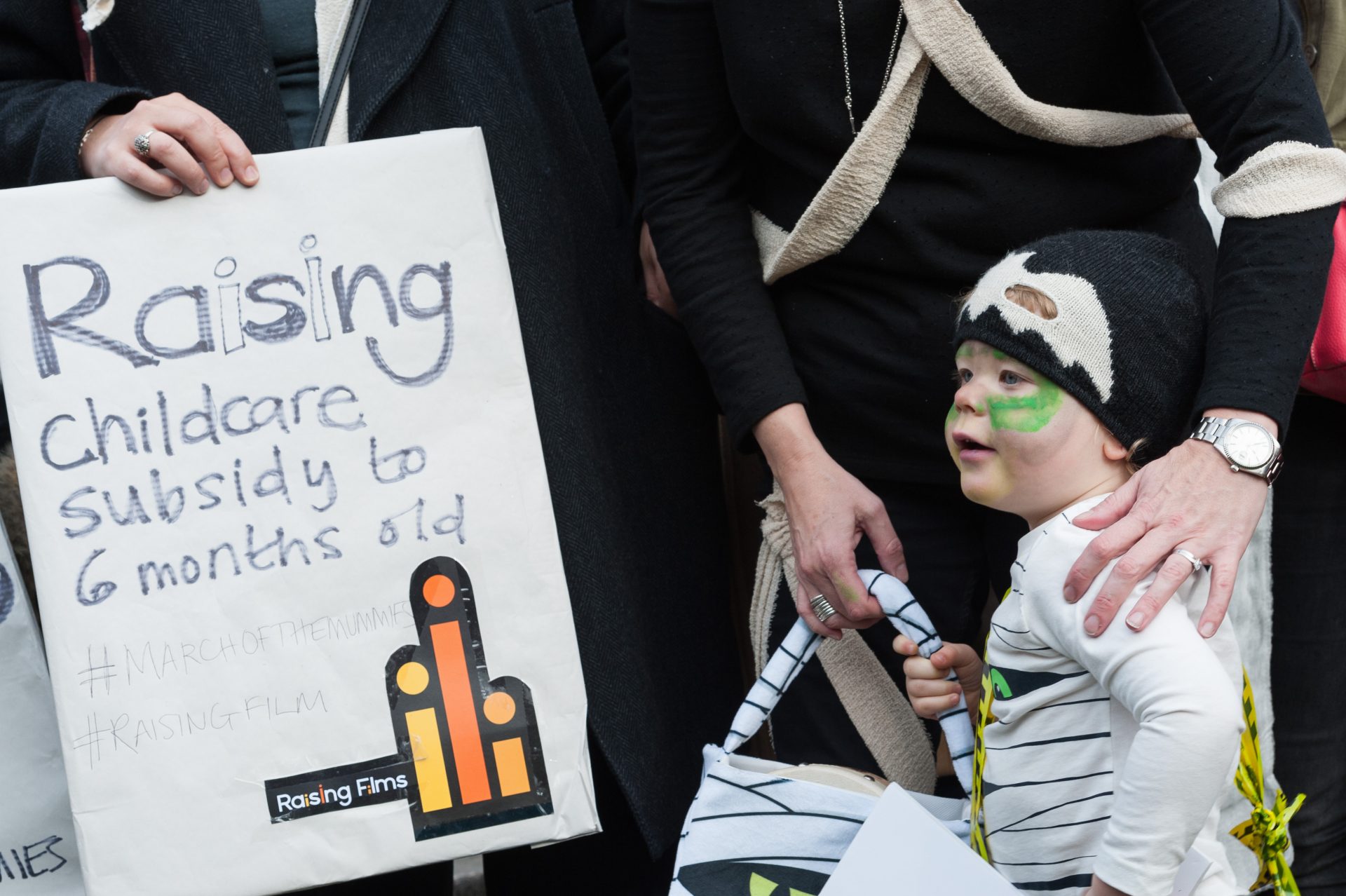Why 10,000 parents are marching for their rights

Written by Lauren Crosby Medlicott
March Of The Mummies is a national protest to demand government reform on childcare, parental leave and flexible working. Here’s why writer Lauren Crosby Medlicott is going along.
At least 10,000 mothers are due to march across the UK at the end of this month to demand urgent intervention from the government for the shocking treatment of mothers and families.
I’ll be carrying my sign and protesting in Cardiff, joining throngs of other mums in 11 regions around the country who are fed up with extortionate childcare costs, pitiful financial support for new parents and a lack of good quality part time and flexible work.
“Mothers from all over the UK have come together because enough is enough,” said Joeli Brearley of Pregnant Then Screwed, the charity that has organised the protests. “The pandemic brought into sharp focus how the needs of mothers and pregnant women are sidelined and ignored by those in power. That anger has grown with the cost of living crisis disproportionately impacting women and the near collapse of the childcare sector.”
Recent data from the Office for National Statistics has shown that women are dropping like flies from the workforce. They are not leaving the labour market by choice; they are leaving because the system no longer works for them.
“We have the second most expensive childcare in the OECD with two-thirds of families paying the same or more for their childcare as their rent or their mortgage,” said Brearley. “Even if you can afford childcare, your chances of accessing it can be slim, with 4,000 childcare providers closing between March 2021 and March 2022. If you can’t access childcare then you simply cannot work and you are therefore prevented from financially contributing to your family or the economy.”
Since having children, I’ve chosen to be the primary child carer for our three kids. Although I loved being home with them, there wasn’t much of a choice. If I returned to work, my salary would go solely towards paying for childcare costs. I’ve put my whole career on hold because there was no other option.
There are women who have found it far worse than me as the cost of living crisis continues to soar. A recent survey from Pregnant Then Screwed revealed that 48% of pregnant mothers will have to cut their maternity leave short due to financial hardship. Shockingly, 60.5% of mothers who had an abortion in the last five years said childcare costs were a factor in their decision to terminate the pregnancy, and 43% said they were considering leaving their jobs as a direct result of childcare costs.
“Mothers and families are completely deflated; they feel abandoned by this government,” said Brearley. “We’ve got a yawning gender pay gap, women terminating pregnancies, thousands more who desperately want children but can’t afford to take the risk. Women are falling out of the workforce in droves and children are being pushed into poverty. What for? All because of an unaffordable, inaccessible, dysfunctional childcare sector that has been neglected for the past decade by this government. A number of broken promises about making flexible working the default and a parental leave system that simply isn’t working.”
When Freya Armstrong gave birth to her little boy 16 months ago, she never expected to be trapped in a part-time job, claiming Universal Credit to supplement her single-parent income.
While she was receiving Statutory Maternity Pay, Freya was struggling to afford to provide for herself and her baby. “I was actively skipping meals to make sure my child was fed,” she said. “I was going to food banks every single month. Basically, I was just scrimping through life, getting myself into more debt. Any money I did have just went towards the house, heating and clothes. The pay just wasn’t manageable.”
Once her baby turned one and Statutory Maternity Pay stopped, Freya made the decision to stay home with her son and started receiving standard Universal Credit payments that came to £1,500 per month. “I had to use it to cover everything with that payment,” the 28-year-old said.
Saying she was “couldn’t afford to live”, Freya took a part-time job as a data researcher, assured she would be able to claim 85% of childcare costs back from the government. Unfortunately, she wasn’t aware that the first childcare invoice had to be paid by her, and then eventually reimbursed. “I had to come up with £700 I didn’t have,” she said. “I had to beg and borrow to make that first payment.”
Even through Freya would like to work more, she knows her benefits and childcare payments will stop if she increases her hours and income, leaving her unable to afford childcare while she worked. “I’m stuck in a position of having to constantly be on benefits and I don’t know how I will get out of that loop,” she said. “I’m trapped, helpless. I feel like people perceive me as lazy, a scrounger. I don’t want to be on benefits, but I don’t have an option.”
In the recent mini-budget proposed by Liz Truss’s newly formed government, it was announced part-time workers face benefit cuts if they don’t look for more work. The proposed policy will disproportionately impact mothers who work part-time as they can’t afford childcare costs and do the majority of unpaid labour in homes.
Although Pregnant Then Screwed is under no illusion that a protest will immediately change the situation, it is expecting a long-term impact from the message that thousands of angry woman and men will communicate by taking to the streets to demand action.
“A protest communicates a credible threat,” said Brearley. “It says we are organised, we are angry and we will not stand for this. It signals to those in power that if they want to be re-elected then they better act on this issue. But more importantly, a protest focuses the public’s attention on a specific issue. In this case, there are large swathes of the public who don’t understand the specific challenges parents face and neither do they care. This is our chance to change their mind, to show them that this is an issue that affects us all because it makes us all poorer. If we can get the general public onside, then the government is forced to act.”
After only three months on maternity leave with her youngest child, Jessica Cockerill and her husband made the decision that she would have to return to work as the £150 she was getting each week was just not enough to cover their basic expenses.
“By this time, all of our bills started to increase as well,” the 38-year-old said. “First it was our electricity and gas, then water, council rates and food. We were really financially struggling. We had to go to food banks and borrow money from family.”
Even though her husband was earning a decent wage, Jessica knew she had no other option except to return to work.
“I was upset that I had to go back, but at least I was going back to a job I loved,” she said.
However, when she went back after five months on maternity leave, she was told her role was no longer available and she would now be reporting to the people who used to report to her.
“I went back to work doing something completely different,” she said. “I kept wondering why I was there, why I was away from my children.”
Jessica contacted Pregnant Then Screwed to support her through workplace maternity discrimination and she has since changed jobs and is working full-time. Her daughter is in full-time nursery, but even after 30 hours of childcare funding, Jessica is still paying £600 a month for her to attend.
“Our son has to stay home with us because we can’t afford to put him into care,” Jessica said. “It makes working from home incredibly hard. When we looked at the option of putting them both into childcare, we calculated I would walk away with only £150 at the end of the month. I would never see them and we wouldn’t be better off financially. There was just no point.”
On top of everything, Jessica’s landlord has increased their rent by £400, forcing Jessica and her family to move elsewhere.
“I already have mental health issues,” Jessica admitted. “I’m finding dealing with all of this is making my anxiety much higher. I’m marching in London on the 29th because if my daughter ever chooses to have children, I want her to have support. The way things are now is not OK.”
Freya, Jessica, me and more than 10,000 other mothers will all be raising our voices with our bodies on the 29 October to call for reform on three key issues:
- Increased funding for the childcare sector to enable affordable, high-quality childcare for all children
- Ringfenced and properly paid maternity and paternity leave
- All jobs to be flexible by default
We’ve had enough of government policies that punish women for being mothers. It’s time for change. Without it, Brearley warns women will continue to fall out of the workforce, the gender pay gap will continue to widen and poor children will be born into poverty.
“When women return to work the economy wins, as do families and children,” says Brearley. “Women’s economic empowerment hinges on a system that works for us, and the government needs to start taking this – and us – seriously.”
Images: Getty
Source: Read Full Article
